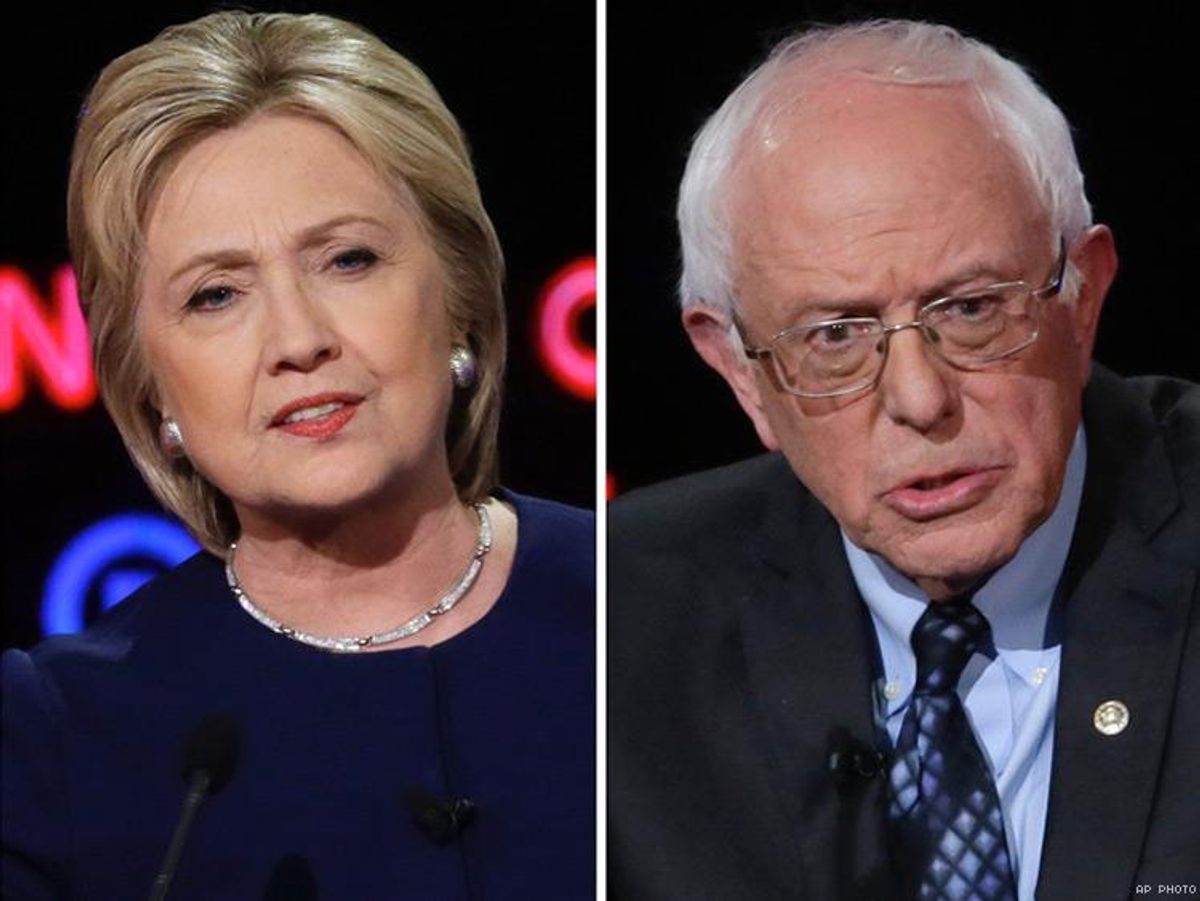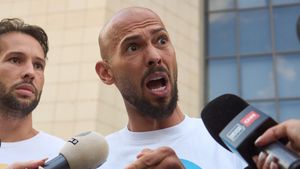Hillary Clinton has won the Democratic presidential primaries in Florida, North Carolina, Ohio, Illinois, and Missouri. She was declared the winner of the first three shortly after polls closed, but the latter two were close races that were not decided until after midnight Eastern time.
In Florida, with 99 percent of precincts reporting at midnight Eastern time, Clinton had 65 percent of the vote, Bernie Sanders 33 percent, according to the Associated Press.
Florida has 214 delegates, awarded proportionally. AP has Clinton with 122 delegates so far and Sanders with 60.
Speaking to supporters in Florida, Clinton invoked LGBT rights as something she'll work on as president, along with voting rights, workers' rights, women's rights, and the rights of people with disabilities.
"This is another Super Tuesday for our campaign," she said of her wins in the three states so far, shorly after 9 p.m. Eastern, noting that her supporters "voted for our tomorrow to be better than our yesterday."
Even with two states yet to be decided, she said, "We know we will add to our delegate lead ... we are moving closer to securing the Democratic Party nomination and winning this election in November."
She took a shot at Republican front-runner Donald Trump's promises to deport undocumented immigrants, bar Muslims from entering the U.S., and use so-called enhanced interrogation techniques on suspected terrorists. "When he embraces torture, it doesn't make him strong, it makes him wrong," she said.
She congratulated Sanders on his "vigorous campaign," but in what may have been a reference to the Vermont senator, she described herself as a candidate who has both "the ideas and the know-how" to create good jobs and upward mobility.
Sanders, speaking to supporters in Arizona, which will hold its primary next week, showed no sign of leaving the race any time soon. "Are you tired of a handful of billionaires running our economy?" he said. "If you have, you've come to the right place." He promised to continue his fight for greater economic equality and to reform the campaign finance system.
Later in the evening, after Missouri and Illinois were decided, Sanders issued this statement of resolve: "I congratulate Secretary Clinton on her victories on Tuesday. I also want to thank the millions of voters across the nation who supported our campaign and elected delegates who will take us all the way to the Democratic National Convention in Philadelphia. With more than half the delegates yet to be chosen and a calendar that favors us in the weeks and months to come, we remain confident that our campaign is on a path to win the nomination."
On Clinton's performance, the Human Rights Campaign, which has endorsed her, released the following statement:
"From North Carolina to Florida to Ohio, fair-minded voters have begun unifying to ensure we are prepared to defeat whichever anti-LGBT candidate emerges as the Republican nominee. Tonight's decisive victories for Hillary Clinton in key states across the nation have put us closer to preserving a pro-equality White House come November. She has proven time and again that she will fight for the LGBT community -- and we are proud to continue to fight alongside her to make sure no opponent of LGBT equality ever sets foot in the Oval Office," said HRC President Chad Griffin.
"John Kasich may have won the state of Ohio tonight, but with an anti-LGBT record, he won't win the hearts and minds of millions of pro-equality voters should he somehow manage to find a path to his party's nomination. As Donald Trump, John Kasich, and Ted Cruz threaten to overturn, undo, and undermine the progress we have made under President Obama, we are ready to double down and fight like hell to elect Hillary Clinton in November."
As for the other states: North Carolina has 107 delegates, also awarded proportionally, as the remaining states do as well. As of about midnight Eastern, with all precincts reporting, Clinton had 55 percent of the vote, Sanders 41 percent, AP reports. She has been awarded 59 delegates, Sanders 42.
In Ohio, with 99 percent of precincts reporting shortly after midnight, she had 57 percent of the vote, according to AP, and Sanders 43 percent. Ohio has 143 delegates; Clinton had been awarded 75 and Sanders 54 so far.
In Illinois, where Clinton was born and grew up, she had 50.4 percent of the vote and Sanders 48.5 percent, with 99 percent of precincts reporting. She had been awarded 66 of the state's 156 delegates, Sanders 64.
In another close race, in Missouri, shortly after 1 a.m. Eastern, NBC News declared Clinton the apparent winner, with 50 percent to Sanders's 49 percent. The 71 delegates are still to be apportioned, and the margin is small enough to trigger a recount.
The delegate count for each candidate so far, per AP, is 1,094 pledged delegates and 467 superdelegates for Clinton, for a total of 1,561, and 774 pledged delegates and 26 superdelegates for Sanders, for a total of 800. Superdelegates are elected officials and other party leaders who can support the candidate of their choice, regardless of primary outcomes; the Republican Party does not have superdelegates. To win the nomination, a candidate needs 2,383 delegates, including superdelegates.
Watch video of both candidates' speeches below.























































































